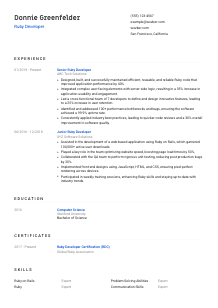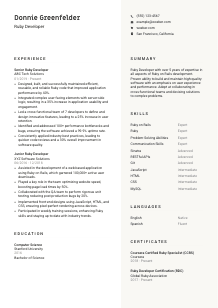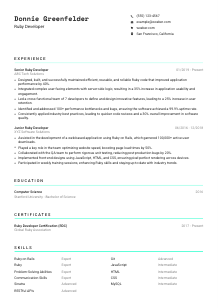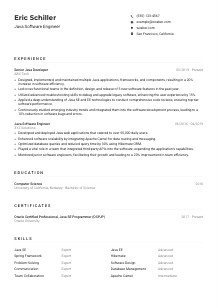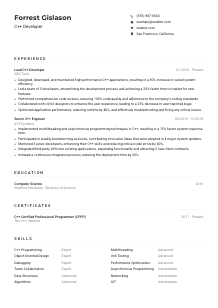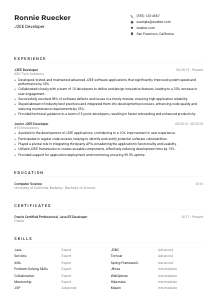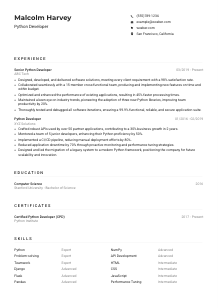Ruby Developer CV Example
Crafting gems in code, but your CV feels rough? Delve into this Ruby Developer CV example, polished with Wozber free CV builder. See how easily you can showcase your Ruby expertise to align with job needs, paving your career path as smooth as a well-refactored algorithm!
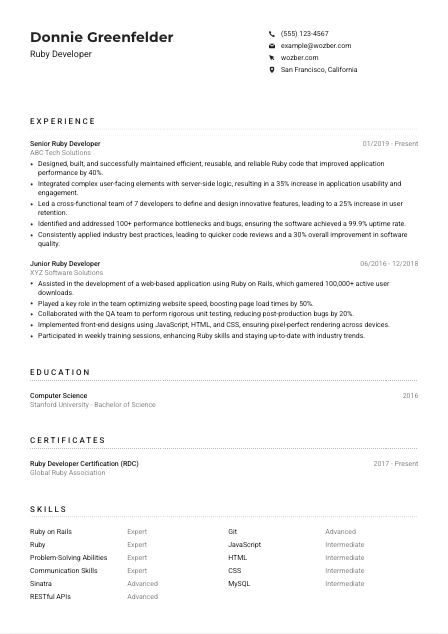
How to write a Ruby Developer CV?
Embarking on the quest for your ideal Ruby Developer role? Your CV isn't just a piece of paper; it's the code that gets you through the initial stages of the hiring process. By harnessing the power of Wozber's free CV builder, including its ATS-friendly CV templates and ATS CV scanner for keyword optimisation, you're about to craft a document that isn't just tailored to your dream job's specs but also a testament to your Ruby prowess. Let's dive in and translate your Ruby skills and experiences into a standout CV.
Personal Details
Starting with personal details sets the ground for your professional introduction. It's essential to hit the mark with precision, ensuring your details resonate with the Ruby Developer role. Let's navigate through tailoring this section with a Ruby Developer touch, making every detail count.
1. Name with a Signature Touch
Think of your name as the class name in your Ruby script - it has to stand out and be clear. Opt for a legible font that's slightly larger than the rest. This is your first impression, your brand, so make it count.
2. Match the Job Title
Just as in Ruby where specificity matters, don't be afraid to tailor your title right below your name. Matching the job title, 'Ruby Developer,' directly informs the hiring manager of your desired role, making you relevant from the get-go.
3. Precise Contact Details
Use a professional email address that's simple yet distinct, akin to naming a method in Ruby - straightforward and descriptive. Your most reachable phone number is like a callable function, ready and available when needed.
4. Address as a Key Requirement
Being located in San Francisco adds immense value, much like a crucial library within your Ruby environment. By stating this upfront, you are already fulfilling a significant requirement, analogous to having the right gem in your application.
5. Professional Links as User Interfaces
Your LinkedIn or personal website is your GUI in the professional world. Keep them updated and reflective of your CV, ensuring a seamless user experience for potential employers who wish to dive deeper into your professional persona.
Takeaway
The Personal Details section of your CV is more than formalities - it's your initial commit in this application's repository. Make it clean, precise, and indicative of your professionalism and readiness for the Ruby Developer role.





Experience
Your experience section is where your professional story unfolds, displaying your success in the Ruby realm. Let's map out how to construct your narrative, focusing on projects and achievements that highlight your Ruby expertise and alignment with the job's demands.
- Designed, built, and successfully maintained efficient, reusable, and reliable Ruby code that improved application performance by 40%.
- Integrated complex user‑facing elements with server‑side logic, resulting in a 35% increase in application usability and engagement.
- Led a cross‑functional team of 7 developers to define and design innovative features, leading to a 25% increase in user retention.
- Identified and addressed 100+ performance bottlenecks and bugs, ensuring the software achieved a 99.9% uptime rate.
- Consistently applied industry best practices, leading to quicker code reviews and a 30% overall improvement in software quality.
- Assisted in the development of a web‑based application using Ruby on Rails, which garnered 100,000+ active user downloads.
- Played a key role in the team otimizing website speed, boosting page load times by 50%.
- Collaborated with the QA team to perform rigorous unit testing, reducing post‑production bugs by 20%.
- Implemented front‑end designs using JavaScript, HTML, and CSS, ensuring pixel‑perfect rendering across devices.
- Participated in weekly training sessions, enhancing Ruby skills and staying up‑to‑date with industry trends.
1. Dissect the Role Requirements
Begin with a solid understanding of what the position entails, from Ruby on Rails development to collaborating on cross-functional teams. This insight will serve as your guide in emphasizing the relevant experiences.
2. Structure with Your Ruby Journey
Timeline your journey, placing your most impactful Ruby role at the forefront. Each position is a class in your module, contributing to the robustness of your Ruby expertise.
3. Highlight Ruby-Specific Achievements
Here's where you shine - list accomplishments such as otimizing application performance or leading development teams through successful feature deployments. Use action verbs and quantify your successes, akin to running a successful test suite in Ruby.
4. Quantify with Metrics
In Ruby development, success is often measured in improved performance, reduced bugs, or increased user engagement. Apply the same principle here by quantifying achievements, making your impact tangible and measurable.
5. Relevance is Key
Just as irrelevant code leads to bloat in a Ruby application, unnecessary details can clutter your CV. Keep your experience focused on Ruby Development, ensuring each bullet point reflects your suitability for the role.
Takeaway
Crafting your experience section with a focus on your Ruby achievements paints a vivid picture of your capabilities. It's your personal Git history of professional development, showing progress and dedication to mastering your craft. Remember, you're not just listing jobs; you're narrating your journey in Ruby development.
Education
Though the path to becoming a Ruby Developer might not always require formal education in the field, showcasing your educational background effectively can provide a solid base for your expertise. Let's encode this section to reflect your readiness for the Ruby role.
1. Identify Relevant Credentials
Even though the job description may not specify educational requirements, highlighting your degree in Computer Science or a related field underpins your foundational knowledge in programming and software development.
2. Organize for Clarity
Maintain a clean and concise format that's easy to read. Include your degree, the institution, and the graduation date. Think of it as structuring a clean code block - it should be straightforward and understandable at a glance.
3. Tailor to the Ruby Ecosystem
If your educational background directly contributes to your expertise in Ruby, make that connection explicit. Whether it was a project, thesis, or specific coursework, let these details shine if they add to your Ruby cred.
4. Highlight Supplementary Education
In the evolving world of Ruby development, continuous learning is key. Including relevant courses, workshops, or certifications can showcase your commitment to staying updated with the latest Ruby trends and practices.
5. Non-traditional Education Counts
Remember, coding bootcamps, online courses, and self-taught experiences hold significant value in the tech community. If these experiences helped carve your path in Ruby, they deserve a spot in your educational narrative.
Takeaway
Your education section is a testament to the foundation upon which you've built your Ruby expertise. Whether through formal university education, online courses, or self-directed learning, it showcases your commitment to mastering the craft of Ruby development.
Certificates
Continued learning and certification are hallmarks of a dedicated Ruby Developer. In a field that values constant growth, showcasing your certifications can set you apart. Let's curate this section as a display of your ongoing commitment to excellence.
1. Match With Job Necessities
Start by analyzing the job description for any mentioned certifications. Even if none are specified, think about what certifications would hold value, such as a Ruby Developer Certification or a course completion relevant to the Ruby ecosystem.
2. Prioritize Pertinence
List certifications that prove your expertise in Ruby and related technologies. Each one is a testament to your skills and dedication, akin to mastering a complex Ruby gem. Quality here definitely trumps quantity.
3. Dates Demonstrate Dedication
Including the acquisition or renewal dates of your certifications shows a timeline of your commitment to staying current. It's like documenting version updates in Ruby software - it shows progression and maintenance.
4. Stay Proactive
The tech field is continually evolving, and so should your knowledge base. Regularly updating your certifications and pursuing new ones in your field not only boosts your expertise but also shows potential employers your passion for learning.
Takeaway
Your certificates section is your personal showcase of technical achievements and learning milestones. Don't underestimate its power. Well-chosen certifications highlight your commitment to professional growth and expertise in the Ruby realm.
Skills
In the realm of Ruby development, your skills are your most valuable assets. This section is where you list the programming languages, frameworks, and tools you're proficient in. Let's optimise this part to reflect the depth of your Ruby expertise, aligning with the job's specifications.
1. Decode and Align
Evaluate the job posting to understand the specific skills sought. Apart from Ruby on Rails, are they looking for experience with Sinatra, RESTful APIs, or front-end technologies? This is where you align your skills with the needs of the role.
2. Prioritize and Organize
Place the most relevant skills at the top. If 'Ruby' and 'Ruby on Rails' are what you excel at, they should lead your list. Follow with complementary skills such as 'Sinatra,' 'JavaScript,' 'HTML,' and 'CSS,' mirroring the job description.
3. Showcase Versatility and Depth
Remember to include both hard skills like programming languages and soft skills like problem-solving and communication. The best Ruby applications are well-rounded, and so should be the developer behind them.
Takeaway
Your skills section is a direct reflection of your professional arsenal. It's not just about listing what you know; it's about proving your alignment with the Ruby Developer role you're aspiring to. Consider this section as your personal inventory of gems, ready to be utilized in building the best Ruby applications.
Languages
In a globalized job market, your ability to communicate in multiple languages can provide an edge, especially in diverse and cross-functional teams. While the Ruby Developer role emphasizes English proficiency, showcasing your multilingual skills can broaden your appeal.
1. Priority to Job Specification
Start with the languages directly asked for in the job posting. In this case, English was a must-have, so ensure it's listed prominently, with a clear indication of your fluency level.
2. List Additional Languages
Even if the job description only mentions English, including other languages can set you apart. Each additional language is like a new framework or library that can be applied to solve problems in diverse environments.
3. Accurate Proficiency Levels
Be honest about your language skills, using terms like 'Native,' 'Fluent,' 'Intermediate,' or 'Basic.' This clarity will help avoid any misunderstandings and showcases your self-awareness.
4. Understand the Job's Reach
If the role involves international collaborations or client interactions, highlighting additional languages could significantly bolster your application, presenting you as a versatile and accommodating candidate.
5. Reflect on Your Language Learning Journey
Learning a new language, much like mastering a new programming language, is a journey. Portraying your linguistic capabilities honestly reflects your commitment to learning and adapting, valuable traits in any field.
Takeaway
The Languages section of your CV isn't just about fulfilling a requirement; it's about showcasing your ability to communicate and collaborate in a global context. Whether it's Ruby code or spoken languages, your proficiency can open doors to new opportunities and understanding.
Summary
Your summary is the concise method that initializes the detailed class of your professional story. A well-written summary provides a snapshot of your skills, experiences, and goals in relation to the Ruby Developer role. Let's encapsulate your professional identity with clarity and relevance.
1. Reflect the Role's Core
Start by absorbing the essence of the Ruby Developer position. Ask yourself, 'What makes someone excel in this role?' Consider how your background, from tackling performance issues to leading project teams, aligns with these core qualities.
2. Lead with a Strong Introduction
Your opening sentence should establish you as a seasoned Ruby Developer, directly addressing your experience and primary areas of expertise. Think of it as your thesis statement - succinct, compelling, and foundational.
3. Detail Your Ruby Highlights
Identify key successes and skills that pertain directly to the job description, such as your proficiency in Ruby on Rails or your experience integrating user-facing elements with server-side logic. Make every word count.
4. Conclude with Precision
Keep your summary concise, aiming for three to five impactful lines. This isn't about providing a comprehensive history but rather distilling your professional journey down to its most persuasive points.
Takeaway
Consider your summary the 'hello.rb' of your CV - it's there to introduce you and make a compelling case for your candidacy right from the start. By carefully crafting this section, you're inviting hiring managers to delve deeper into your CV, primed with an understanding of your relevance and potential impact as a Ruby Developer.
Launching Your Ruby Developer Journey
With these tailored steps, you're well on your way to crafting a CV that not only meets but exceeds the expectations for a Ruby Developer role. Remember, your CV is your personal codebase - it needs to be clean, efficient, and constantly evolving. Wozber's free CV builder, with its ATS-friendly CV template and ATS CV scanner, provides the perfect development environment to ensure your CV is ready for the future. Happy coding, and here's to landing your dream Ruby Developer position!

- Minimum of 3 years of professional experience in Ruby on Rails development.
- In-depth understanding of the Ruby language and its ecosystem including popular gems and best practices.
- Proficient in using frameworks such as Rails and Sinatra to build RESTful APIs and web applications.
- Familiarity with front-end technologies, such as JavaScript, HTML, and CSS.
- Strong problem-solving abilities and excellent communication skills, both verbal and written.
- Competence in both spoken and written English is essential.
- Must be located in San Francisco, California.
- Design, build, and maintain efficient, reusable, and reliable Ruby code.
- Integrate user-facing elements with server-side logic.
- Collaborate with cross-functional teams to define, design, and ship new features.
- Identify performance bottlenecks and bugs and devise solutions to address those issues.
- Follow best practices, code reviews, and perform unit tests to ensure high-quality software.





